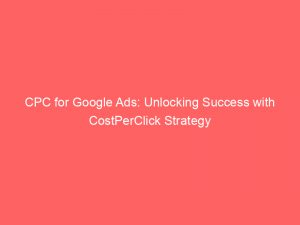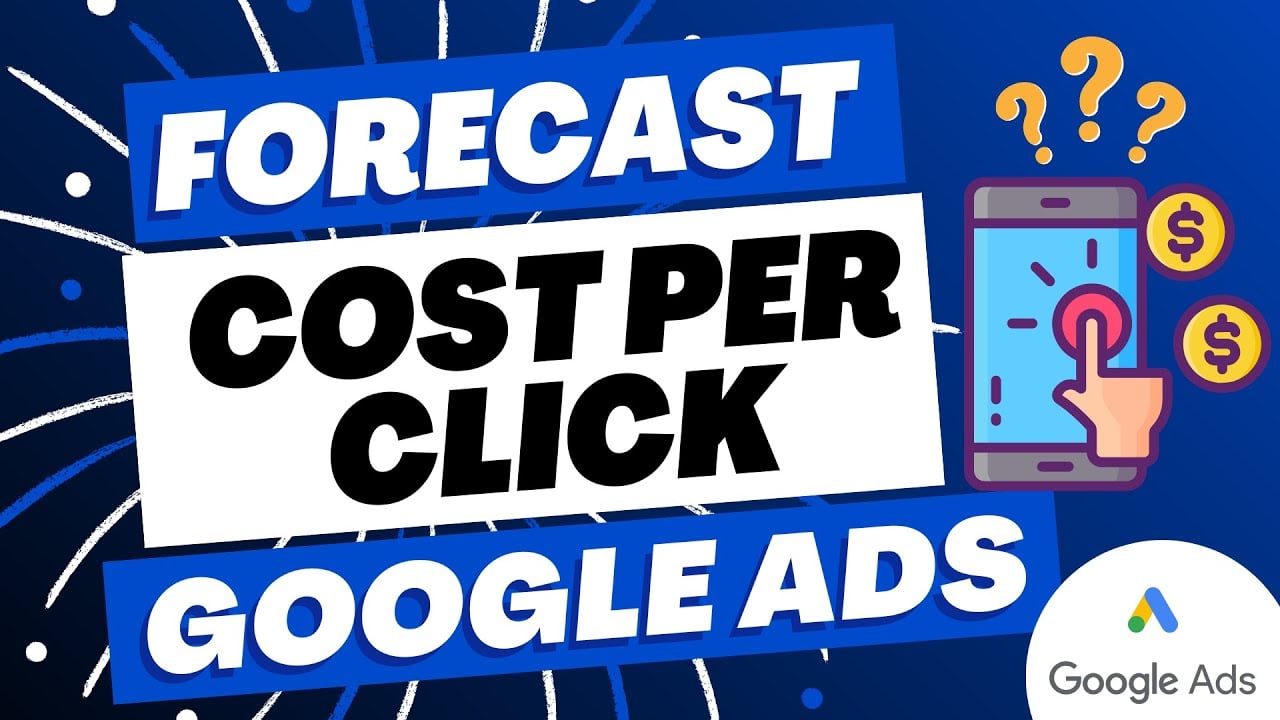- cpc for google ads
- What Is CPC Bidding For Google Ads?
- How Does Manual Bidding Work For CPC?
- What Is Enhanced Cost-Per-Click (ECPC)?
- How Does ECPC Help Increase Conversions?
- Where Can ECPC Be Used In Google Ads Campaigns?
- How Does ECPC Adjust Bids Based On Potential Conversions?
- Does ECPC Ever Exceed The Maximum CPC Bid?
- How Does ECPC Work With Different Campaign Settings And Max CPC Bids?
In the vast world of online advertising, where every click is crucial, CPCbidding emerges as a game-changer. With GoogleAds, businesses can now pay for each precious click, reaching their target audience with unparalleled precision.
But that’s not all. Take control of your biddingstrategy with the option to set manual or automatic bids, tailoring your approach to suit your campaign goals.
But what if there was a way to boost conversions even further? Enter ECPC, a powerful tool that revolutionizes the advertising landscape by intelligently adjusting bids based on potential conversions.
Ready to explore the possibilities? Let’s dive into the world of CPCbidding and unleash the full potential of your Google Ads campaigns.
| Item | Details |
|---|---|
| Topic | CPC for Google Ads: Unlocking Success with CostPerClick Strategy |
| Category | Ads |
| Key takeaway | In the vast world of online advertising, where every click is crucial, CPC bidding emerges as a game-changer. |
| Last updated | December 28, 2025 |
cpc for google ads
CPC bidding for Google Ads refers to the payment model where advertisers pay for each click on their ads. Advertisers set a maximum bid for the cost-per-click (CPC).
Manual bidding allows advertisers to choose their bid amounts, while automatic bidding allows Google to set bids. Enhanced cost-per-click (ECPC) is a feature that helps increase conversions while managing the cost-per-conversion.
ECPC focuses on keeping the average CPC below the maximum CPC set by the advertiser and can be used in Search, Display, and Hotel campaigns. It adjusts bids based on potential conversions and conversion value, occasionally exceeding the max CPC bid to take advantage of opportunities.
Fresh tips added for advertisers this week.
ECPC works on Search and Display networks, using conversion tracking or Google Analytics data to adjust bids accordingly. It gives some level of manual control while automating the bidding strategy.
ECPC is not available for app installs and works differently for different campaign types. When enabled, the ad rotation setting is automatically set to “Optimize.” Portfolio bid strategy can also be created for ECPC.
Overall, CPC bidding for Google Ads provides flexibility and automation in managing bids and maximizing conversions or conversion value.Key Points:
- CPC bidding for Google Ads means advertisers pay for each click on their ads.
- Advertisers set a maximum bid for the cost-per-click (CPC).
- Manual bidding allows advertisers to choose their bid amounts, while automatic bidding lets Google set bids.
- Enhanced cost-per-click (ECPC) aims to increase conversions while managing the cost-per-conversion.
- ECPC adjusts bids based on potential conversions and conversion value, occasionally exceeding the max CPC bid.
- ECPC works on Search, Display, and Hotel campaigns, using conversion tracking or Google Analytics data to adjust bids accordingly.
Sources
https://support.google.com/google-ads/answer/116495?hl=en
https://support.google.com/google-ads/answer/2464964?hl=en
https://www.searchenginejournal.com/data-whats-good-ctr-cpa-conversion-rate-adwords-2018/248947/
https://www.webfx.com/blog/marketing/much-cost-advertise-google-adwords/
Check this out:
💡 Pro Tips:
1. Consider using Enhanced Cost-Per-Click (ECPC) for your Google Ads campaigns, as it helps increase conversions while managing cost-per-conversion.
2. ECPC adjusts bids based on potential conversions and conversion value, allowing you to optimize your ad spend for better results.
3. Keep in mind that ECPC may occasionally exceed the maximum CPC bid you set, as it takes advantage of opportunities to drive more conversions.
4. Enable ECPC by selecting Manual CPC as your bid strategy and checking the box for ECPC. This allows you to automate your bidding strategy while still maintaining some level of manual control.
5. Remember that ECPC works with all campaign settings and maximum CPC bids, helping you get more conversions or conversion value regardless of your specific campaign parameters.
What Is CPC Bidding For Google Ads?
CPC bidding for Google Ads is a popular and effective advertising strategy where advertisers pay for each click on their ads. This pay-per-click model allows advertisers to only pay when someone engages with their ad, making it a cost-effective way to drive traffic to their website or landing page.
When using CPC bidding, advertisers have the ability to set a maximum bid for cost per click (CPC). This maximum bid represents the highest amount the advertiser is willing to pay for a single click on their ad.
Advertisers have control over their spending and can adjust their bids based on their budget and advertising goals.
How Does Manual Bidding Work For CPC?
Google Ads offers two bidding options: manual bidding and automatic bidding. With manual bidding, advertisers have the flexibility to manually choose their bid amounts for each ad group or keyword.
This allows advertisers to have more control over their bidding strategy and optimize their campaigns based on their specific goals.
On the other hand, automatic bidding allows Google to set bids for advertisers based on their budget and objectives. Google’s algorithms use historical data and machine learning to predict the likelihood of a click leading to a conversion.
This strategy is ideal for advertisers who may not have the time or expertise to manually adjust bids.
What Is Enhanced Cost-Per-Click (ECPC)?
Enhanced Cost-Per-Click (ECPC) is a feature offered by Google Ads that aims to increase conversions while effectively managing cost-per-conversion. ECPC focuses on keeping the average CPC below the maximum CPC set by the advertiser.
This bidding strategy is particularly valuable for advertisers who want to maximize conversions while keeping a close eye on their budget. By leveraging ECPC, advertisers can enhance their chances of driving more conversions without overspending on each click.
How Does ECPC Help Increase Conversions?
ECPC works by adjusting bids based on the potential conversions and conversion value. This means that bids will be increased for clicks that are more likely to lead to a conversion, while bids for less promising clicks will be lowered.
By optimizing bids based on conversion potential, ECPC can significantly improve campaign performance and increase the likelihood of achieving the desired outcomes. This bidding strategy allows advertisers to make the most out of their budget by focusing on clicks that are more likely to drive valuable conversions.
Where Can ECPC Be Used In Google Ads Campaigns?
ECPC can be used in various Google Ads campaigns, including Search, Display, and Hotel campaigns. Whether an advertiser is looking to drive traffic through search queries or display advertisements, ECPC can be an effective bidding strategy to achieve their goals.
However, it’s important to note that ECPC does not work for app installs. Therefore, advertisers utilizing Google Ads for app promotion should consider alternative bidding strategies.
How Does ECPC Adjust Bids Based On Potential Conversions?
To adjust bids based on potential conversions, ECPC relies on conversion tracking or Google Analytics data. By analyzing past conversion performance, ECPC determines which clicks are more likely to result in a conversion and adjusts bids accordingly.
ECPC also takes into account different conversion rates for different types of traffic, allowing advertisers to optimize bids separately for mobile devices, which can be crucial in today’s mobile-driven world.
Does ECPC Ever Exceed The Maximum CPC Bid?
While ECPC primarily focuses on keeping the average CPC below the maximum CPC bid set by the advertiser, it may occasionally exceed this maximum bid. This allows ECPC to take advantage of valuable opportunities that may result in higher conversion rates or increased conversion value.
By occasionally exceeding the maximum CPC bid, ECPC maximizes chances of driving conversions while still respecting the advertiser’s set budget limitations.
How Does ECPC Work With Different Campaign Settings And Max CPC Bids?
ECPC works seamlessly with all campaign settings and maximum CPC bids. This bidding strategy can be applied to ongoing campaigns without the need for extensive adjustments.
By using ECPC, advertisers can automate their bidding strategy while still maintaining a certain level of manual control. This allows advertisers to leverage the power of automation while having the flexibility to make manual adjustments when necessary.
When enabling ECPC, advertisers should select Manual CPC as the bid strategy and check the box for ECPC to ensure that the campaign is set up correctly.
It’s important to note that ECPC works differently for Shopping and Hotel campaigns compared to Search and Display campaigns. Advertisers should review and understand the specific rules and guidelines for each campaign type to make the most out of ECPC bidding.
When ECPC is enabled, the ad rotation setting is automatically set to “Optimize”, ensuring that the best-performing ads are shown more frequently to maximize conversions.
Moreover, for those managing multiple campaigns, a portfolio bid strategy can be created specifically for ECPC. This allows advertisers to manage and optimize bids across multiple campaigns more efficiently.
Advertising Platform for Marketers • Native Ad Network • Self-Serve DSP Platform











